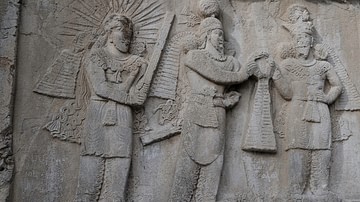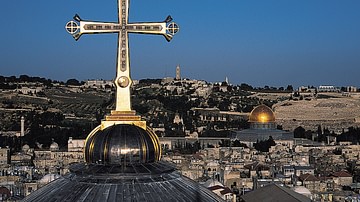Search
Search Results

Definition
Gula
Gula (also known as Ninkarrak) is the Sumerian goddess of healing and patroness of doctors, healing arts, and medical practices. She is first attested to in the Ur III Period (2047-1750 BCE) where she is referenced as a great goddess of health...

Definition
Robert Cushman
Robert Cushman (l. 1577-1625 CE) was an author, lay preacher, and member of the Leiden congregation of separatists (later known as the pilgrims) who negotiated passage for them from the Netherlands to North America in 1620 CE aboard the Mayflower...

Definition
Antoine de Chandieu
Antoine de Chandieu (l. 1534-1591) was a French theologian, who played a decisive role in the religious history of the 16th century but remains in the shadow of other French Protestant leaders. Due to his remarkable abilities and contribution...

Article
Enuma Elish - The Babylonian Epic of Creation - Full Text
The Enuma Elish (also known as The Seven Tablets of Creation) is the Babylonian creation myth whose title is derived from the opening lines of the piece, "When on High". The myth tells the story of the great god Marduk's victory over the...

Article
Twelve Gods of Persian Mythology
Ancient Persian Mythology is the term now referencing ancient Iranian religion prior to the rise of Zoroastrianism between c. 1500-1000 BCE. This was a polytheistic faith with a pantheon led by the supreme god Ahura Mazda (“Lord of Wisdom”...

Article
Early Christianity
Emerging from a small sect of Judaism in the 1st century CE, early Christianity absorbed many of the shared religious, cultural, and intellectual traditions of the Greco-Roman world. In traditional histories of Western culture, the emergence...

Article
The Five Gifts of Hathor: Gratitude in Ancient Egypt
The central cultural value of ancient Egypt was ma'at – harmony and balance – which maintained the order of the universe and the lives of the people. Keeping balance in one's life encouraged the same in one's family and, by extension outward...

Article
Louis XIV and the Revocation of the Edict of Nantes
Beginning in the 16th century, Protestants in France struggled in their rapport with royal power. Protestants owed the recognition of their rights more to sovereign decrees than to genuine tolerance or religious pluralism. The realization...

Article
Origins of Christian Antisemitism in the Gospels
Antisemitism is a modern term that describes prejudice and hostility to Jews and Judaism. The term is derived from the later social scientific categorization of the subfamily of the Afro-Asiatic languages of Hebrew, Aramaic, Arabic, and Amharic...

Definition
Ancient China
Ancient China produced what has become the oldest extant culture in the world. The name 'China' comes from the Sanskrit Cina (derived from the name of the Chinese Qin Dynasty, pronounced 'Chin') which was translated as 'Cin' by the Persians...